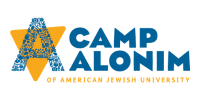Privacy Policy
Camp Alonim, a program of American Jewish University, and American Jewish University and its affiliated organizations respect your privacy. The university maintains and provides a wide array of web sites and web servers operated by the university or third parties on behalf of the university (hereafter referred to as Web Sites). Also, the university distributes to faculty, staff, alumni, friends, prospective students and others e-mail messages that are closely linked to one or more of American Jewish University’s web sites. This statement expresses American Jewish University’s approach to privacy in these arenas.
Student Education Records
American Jewish University complies with the Family Educational Rights and Privacy Act (FERPA), which generally prohibits the release of student educational records without student permission.
Information Usage
In the course of using the Web Sites, you may choose to provide information to the university via web forms, e-mail or other electronic means. Personally identifiable information submitted will be used only for American Jewish University related purposes. American Jewish University will not sell this data to outside parties.
American Jewish University may use this information in any investigation of a potential violation of American Jewish University policies and procedures or as required by federal, state or local law.
Server Logs and E-mail Tracking
American Jewish University servers and Web Sites generally log activity usage of our Web Sites. Such logging includes, but is not limited to:
- Hostname – The hostname and/or IP address of the user/client requesting access.
- HTTP header, “user-agent” – The user-agent information includes the type of browser, its version, and the operating system it is running on.
- HTTP header, “referrer” – The referrer specifies the page from which the client accessed the current page.
- System date – The date and time of the user/client request.
- Full request – The exact request the user/client made.
- Status – The status code the server returned to the user/client.
- Content length – The content length, in bytes, of the document sent to the user/client.
- Method – The request method used.
- Universal Resource Identifier (URI) – The location of a resource on the server.
- Query string of the URI – Anything after the question mark in a URI.
- Protocol – The transport protocol and version used.
- E-mail address – In some cases, the e-mail address of the intended recipient of an e-mail may be logged when a link is accessed inside of an e-mail.
Log Usage
American Jewish University regularly uses analysis and reporting tools to evaluate web server logs and e-mail tracking to understand usage and effectiveness of our Web Sites and e-mail communications. These tools are used to evaluate aggregate usage and analyze trends. American Jewish University, by practice, does not engage in monitoring or tracking the activities of individuals. American Jewish University may use log information in any investigation of a potential violation of American Jewish University policies and procedures or as required by federal, state or local law.
eCommerce
Some American Jewish University Web Sites enable you to pay for products or services online with a credit card or other electronic payment mechanism. Unless otherwise noted, these transactions are encrypted. It is American Jewish University practice that confidential financial information you provide will be used only for the purposes described in that transaction, unless an additional use is specifically stated on that site. Data provided specifically to facilitate credit card or other electronic business transactions are retained only for a reasonable time to effect the transaction. American Jewish University makes reasonable efforts to comply with federal, state and local laws.
Cookies
American Jewish University may use cookies to track the date of last visit or user preferences on a Web Site. Web Sites may use cookies to track and pass session data as a method for facilitating the operation of a specific application.
Exceptions
All American Jewish University Websites conform to this privacy statement unless an alternative privacy statement is explicitly provided on that site.
Links
American Jewish University Websites and e-mails may provide links to non-American Jewish University web sites. American Jewish University is not responsible for the content, privacy policies or practices on those sites.
